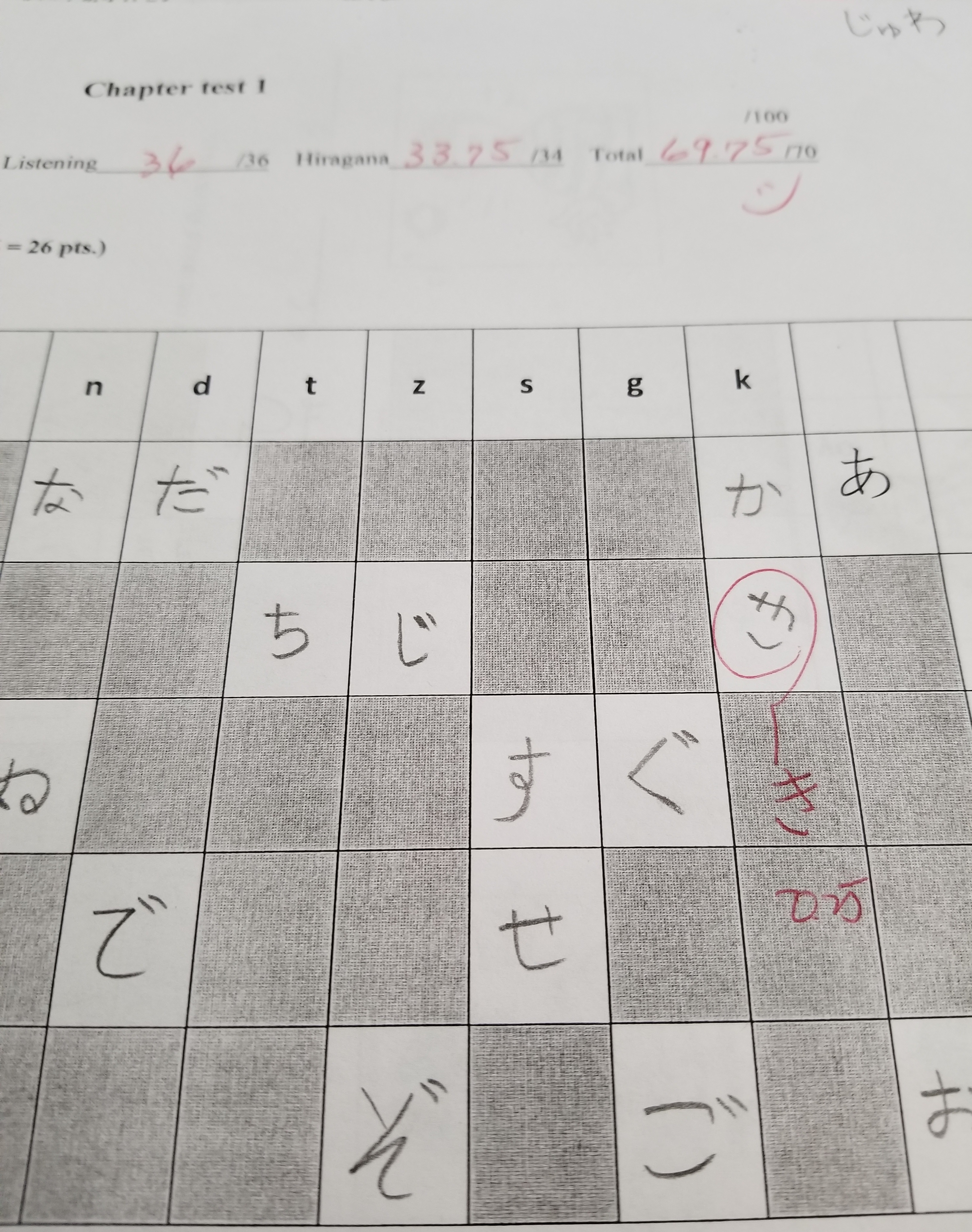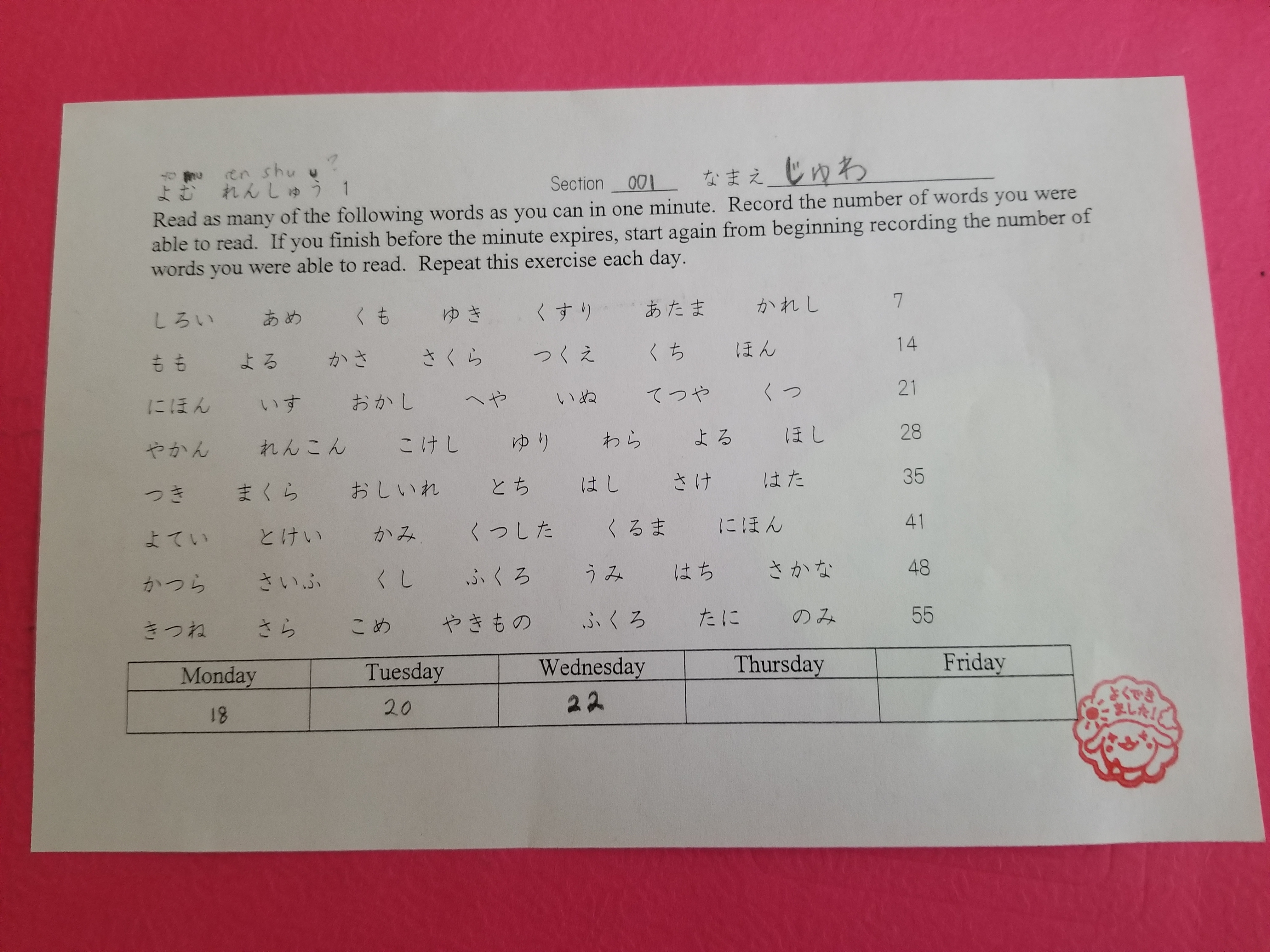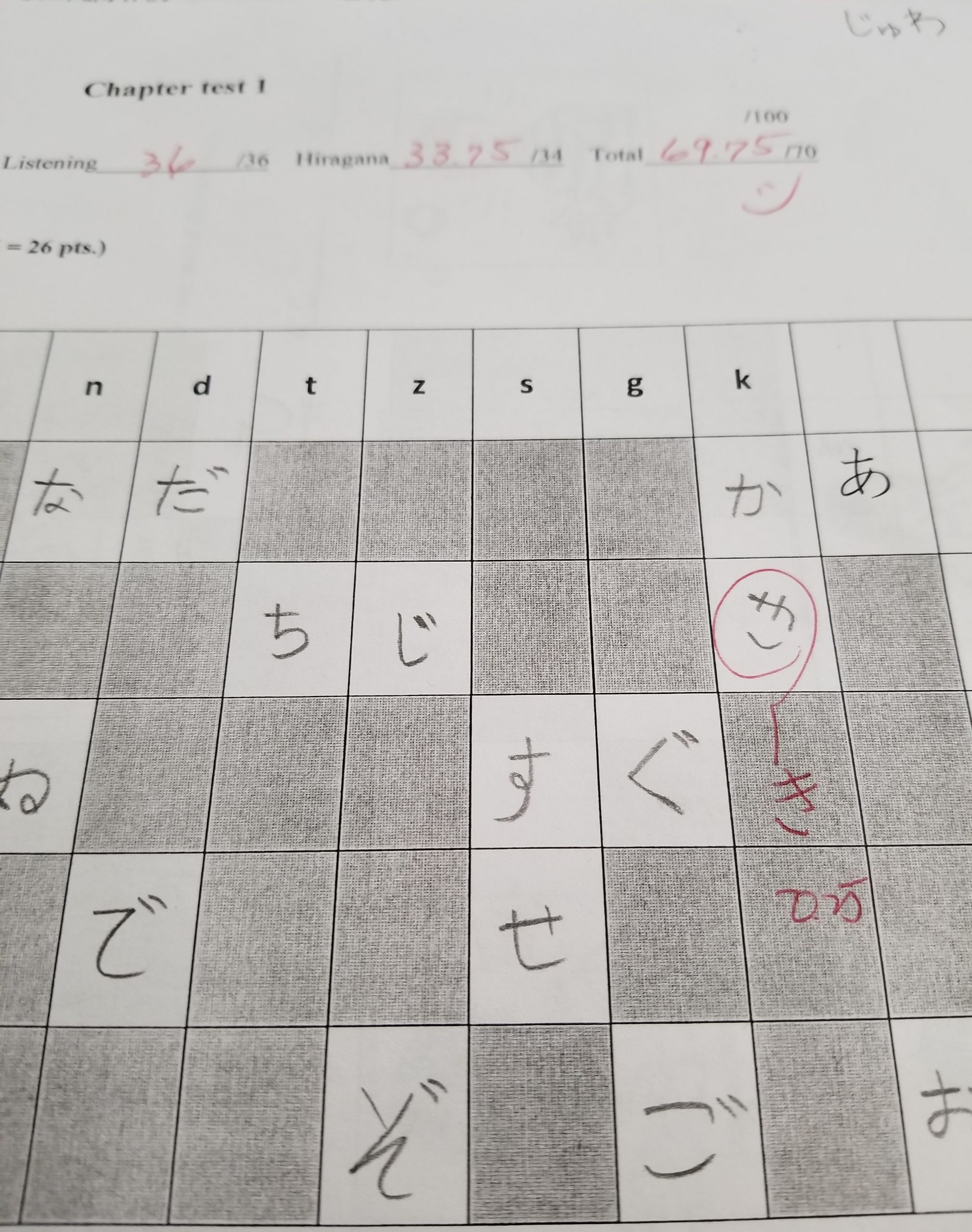
Ok, first, you might want to know how I did in Chapter 1 test. Boom, no, I didn’t get 100% point ☹ My points were deducted .25 because I did not write hiragana for “ki” “correctly” (or maybe the way the teachers wanted me to). You can see the pic. *sigh They look similar, don’t they? 🙊🙈😅
The use of L1 or languages known by the students
I know this debate on the use of L1 in a foreign language has been going on. Some believe that we must use the target language a lot and avoid using L1 for the sake of giving input to the students. Some other believe that using L1 is necessary. Well, I’m both of them. I believe input is important and I believe that using L1 is also necessary, and now I’m experiencing this first-hand. First, one of the teachers seems to be not so good at English (yes, I know it’s not my L1, I refer L1 as the language that the students know or can speak here😊). Thus, it seems so hard for her to give instructions. She wanted us to do something yet couldn’t give clear instructions for us to understand what we were supposed to do. It was kinda awkward. We students tried to guess the task eventually. I knew this teacher tried her best to make us do what we must do, I appreciate it. Still, it’ll be better if she can give us clear instructions in English so we can understand. Minimizing the use of English is ok as long as the teachers can make the students understand the instructions, maybe with the use of gestures, examples, etc. The other teachers are better at this. This one teacher tried to do this too but too slow, so it’s awkward. (Gosh, I hope they didn’t read this. I respect and love my teachers; it’s just that I’m trying to be sincere with how they make me feel as a student 🙈😅✌).
Knowing the language the students speak is also important for foreign language teachers, too. Since Japanese is a “language of sound”, the teachers try to explain the pronunciation by referring to English letter and pronunciation. For example, they repeatedly explain that “ei” is pronounced as long “ee”, not “e””i”; that’s because in English “e” is pronounced /ē/ or /i/, while “I” is pronounced /ai/ or /ī/. (Ok, I know it’s kinda difficult to explain using the correct phonetic transcription, but somehow I hope you get the point). So, I guess the teacher is worried that the students will pronounce “ei” as “iai” instead of as “ee”. And I notice that some friends seem to have difficulties with this too, because they did write how to pronounce that. (I glanced at their notes; I didn’t mean to be rude, it was accidental, ok? ✌) But for me it is easy, because in Bahasa Indonesia “e” is pronounced as /e/ and “I” is pronounced as /i/, so naturally, when they are formed together, the’ll become an “ei” glide, which sounds like long “ee”, or “ei”, not /ei ai/. If the teachers didn’t know this, i.e. that the students might have difficulties, they wouldn’t be able to give clear explanations to help the students learn, right? So, well, in English classes, we’ve always had this debate about native speaker vs non-native speaker teachers and that non-native English teachers often feel not confident with it, so I think if you’re a non-native English speaker teacher teaching English, you shouldn’t worry. You should be proud if you share the same language with the students since it can help to give clearer instructions and explanations and of course it will help them learn the target language better 😊
Never never never judge someone in one frame only!
So, I know that we have this tendency to have certain opinion about someone from the result of our observation. However, we should acknowledge that the observation we did might be incomplete. There is this student in my class. We sat next to each other last chapter. He would often asked me about the materials he didn’t seem to understand and I’d help explain to him and help him understand. But guess what? He actually performed better than me in reading practice. So we had this reading sheet, which contain several Japanese words written in Hiragana. Every day we would be given 1 minute to read them and see how many words we could read in one minute per day and see how we progress throughout the week. Definitely, he could read way more words in a minute compared to me.
There is also another student in my class. He’s so active. He always participates and volunteers. You know, the type of student who always takes the chance to practice till the teachers feel the need to say “no” to give the opportunity to other students? Yup, it’s him. But guess what? One day this guy sat in front of me (well, not exactly, but it allowed me to see him better). Then I noticed (accidentally, ok?) that for the quiz he got bad scores. Man, I got full score for that quiz, so, well… So, that’s it. We can never guess how someone’s performance in general is. Someone might be strong at this point but weak at another thing, and so forth. As for me? Well, I don’t know. I’m not the type who always volunteer or participate. I don’t want to stand out. Plus, I’m not confident. Plus, I feel bad for taking other students’ opportunity to participate because, hey, I’m just auditing this class, not actually taking it for credits. But, well, when I feel bad for volunteering too much sometimes I tell myself that I have the same right, because even if it’s just an audit, I must pay for that, too. So, well, I don’t know…

The reading sheet where we had to record how many words we could read in a minute and see how we progressed each day. We had the Chapter 1 test on Thursday so we didn’t read it. I was absent on Friday so I didn’t read it 😀
Practice for automaticity
Yes! I might have said this before. I’ve always been telling my students the same thing. This is what I believe. In learning a language, we need to practice a lot. Like, real a lot. In my case, I can read hiragana and katakana but it takes me long time to finally understand what character is written and what the word means. I understand, but not as fast. It’s not like English where I can automatically write these words in the right structure or order. In Japanese, I will really have to think what word comes after which. I’m slow. Well, it doesn’t mean that I do not need to think when writing or reading in English, of course I still think of it, except much more quickly. Because we needs time to retrieve the words from our memory or our brain, and if we don’t practice enough, it will take more time for the retrieval. Practice can help us retrieve the words and understand them faster. So basically being automatic is like that. When we practice, we sort of build the pattern in our brain so when we have practiced enough, we figure out the pattern somehow like subconsciously, automatically. When we don’t practice enough, we need time to figure out the pattern because we consciously think of it. Well, how do I explain this? Well, it’s like you move to a new house and try to find the route to your school or workplace. At first, you’re consciously thinking about whether you should go straight, turn left, turn right, at which road, etc. to get to your school, but as you practice or do it repeatedly, you won’t need to consciously think about it; you just know it. It’s automatic. So, yeah, learning a language is like that. Suppose the words or the sentences you want to speak is your destination, you need to take them from your house first. When you haven’t practiced enough, or at the beginning, you will need time to build the structure or the pattern, or to get the words/sentences delivered to the destination because you still need time to figure out the route. But when you have practiced enough, you can deliver them faster as you have known the routes. It’s automatic, you just know it. Is it clearer? Gosh, I don’t know how to simplify this, and I’m not good at using high-level English words either, so, well, pardon.
But, eniwei, I end up writing too long, so I will post the rest in the next post 🙂



Leave a Reply